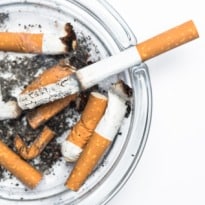Secondhand smoking or passive smoking is when a person inhales the smoke coming from a burning cigarette that someone nearby might be smoking. While secondhand smoking isn't nearly as harmful as smoking itself, it's still known to cause considerable damage. It's also probably why a ban on smoking in public places was introduced.According to a study published in the American Journal of Physiology: Endocrinology and Metabolism, secondhand cigarette smoke not only increases the risk of cardiovascular and metabolic problems, but can also make you fat! This is true especially in the case of people who live or share space with chain smokers. (Smoking ruins your taste buds)The study challenges the decades old belief that smoking cigarettes makes you lose weight or stay slim. Study author Benjamin Bikman, professor of physiology developmental biology at Brigham Young University and his team wanted to investigate how exactly smoking is linked with a person's metabolism. They wanted to pinpoint the mechanism behind why smokers
become insulin resistant. (Smoking may lead to excess calorie intake)
To carry out their study, they exposed lab mice to secondhand smoke and followed their metabolic progression. Mice exposed to smoke put on weight. On further investigation, researchers found that smoke triggered a tiny lipid called ceramide to alter mitochondria
in the cells, causing disruption to normal cell function and inhibiting the cells' ability to respond to insulin. According to co-author Professor Paul Reynolds, "The lungs provide a vast interface with our environment and this research shows that a response to involuntary smoking includes altering systemic sensitivity to insulin."He added, "Once someone becomes insulin resistant, their body needs more insulin. And any time you have insulin go up, you have fat being made in the body." The key to reversing the effects of cigarette smoke, they discovered, is to inhibit ceramide. The researchers found the mice treated with myriocin (a known ceramide blocker) didn't
gain weight or experience metabolic problems, regardless of their exposure to the smoke.
However, when the smoke-exposed mice were also fed a high-sugar diet, the metabolic disruption could not be fixed. Bikman and his team are now looking for a ceramide inhibitor that is safe for humans.Bikman added, "The idea that there might be some therapy we could give to innocent bystanders to help protect them from the consequences of being raised in a home with a smoker is quite gratifying. But for the smokers themselves, there is no 'protective therapy' available."With inputs from PTI
become insulin resistant. (Smoking may lead to excess calorie intake)
To carry out their study, they exposed lab mice to secondhand smoke and followed their metabolic progression. Mice exposed to smoke put on weight. On further investigation, researchers found that smoke triggered a tiny lipid called ceramide to alter mitochondria
in the cells, causing disruption to normal cell function and inhibiting the cells' ability to respond to insulin. According to co-author Professor Paul Reynolds, "The lungs provide a vast interface with our environment and this research shows that a response to involuntary smoking includes altering systemic sensitivity to insulin."He added, "Once someone becomes insulin resistant, their body needs more insulin. And any time you have insulin go up, you have fat being made in the body." The key to reversing the effects of cigarette smoke, they discovered, is to inhibit ceramide. The researchers found the mice treated with myriocin (a known ceramide blocker) didn't
gain weight or experience metabolic problems, regardless of their exposure to the smoke.
However, when the smoke-exposed mice were also fed a high-sugar diet, the metabolic disruption could not be fixed. Bikman and his team are now looking for a ceramide inhibitor that is safe for humans.Bikman added, "The idea that there might be some therapy we could give to innocent bystanders to help protect them from the consequences of being raised in a home with a smoker is quite gratifying. But for the smokers themselves, there is no 'protective therapy' available."With inputs from PTI
Advertisement









